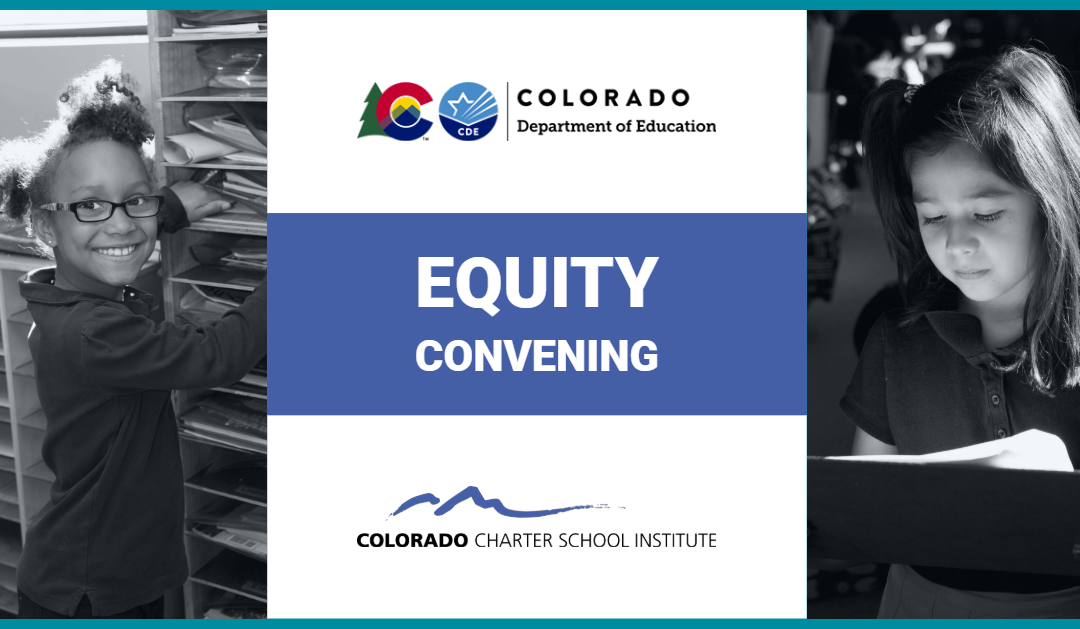As I have shared in previous blog posts, at the heart of CSI’s mission is a focus on high-quality options for all students, with a particular focus on at-risk kids. As an organization, CSI continues to actively prioritize service to and outcomes for at-risk students and has sought to target student needs through a variety of mechanisms. (For more details about our continued work around special education and more recent initiatives, check out a previous blog posted titled Diving into Access and Equity in Special Education.)
As part of our ongoing efforts to address challenges in access and equity, CSI partnered with CDE’s Schools of Choice Unit to offer the first ever Equity Convening. A special thanks to Clare Vickland, CSI’s Director of Students Services, who took lead on coordinating and facilitating the event. This daylong event took place on Friday, September 6, 2019, and was met with a packed room of school leaders, special education practitioners, district authorizer staff, and support organizations.
Real conversations, thorough research, thoughtful insights, and practical takeaways filled the day. CSI will issue a White Paper later this fall that will serve as a comprehensive resource on session details and next steps. In the meantime, here are some of my more immediate takeaways:
Data shows that access and equity are challenges not just to the charter sector, but to the whole public education system.
Statistics offered throughout the day identified that in several areas Colorado lags behind the nation in terms of access and equity. Ryan Marks, CSI Director of Evaluation & Assessment, led a session outlining the research on access and equity within Colorado and across the nation. The data identified that while the enrollment of students with disabilities is growing in Colorado charter schools, fewer students with disabilities enroll in charter schools in Colorado than traditional public schools. Colorado’s public school enrollment of students with disabilities is in turn lower than that of the United States.
Of course, when discussing data, additional context is important. Conversations among attendees brought up some considerations about data accuracy related to over- and under-identification, as well as the constraints some authorizers may place on which students with disabilities charter schools are allowed to serve.
Some challenges to access and equity are systemic.
Panelists representing various perspectives weighed in on the challenges that must be overcome in order to better serve students with disabilities. The challenges that were most described are larger, systemic issues.
State Senator Zenzinger identified one of the most pressing shortages in our education system: special education teacher shortages. Special Education teachers are two times as likely as other teachers to change schools in Colorado. (A recent Chalkbeat article provides more details.) The educator shortage has been an ongoing area of focus at the state level, with the Colorado Department of Education and Colorado Department of Higher Education partnering this past year to collect data to analyze in order to develop an action plan to address it.
Coupled with staffing difficulties is the real challenge of funding, which STRIVE CEO, Chris Gibbons, acknowledged. While there has been $22 million influx into the funding formula to specifically address students with special needs (thanks to State Senator Rachel Zenzinger’s successful amendment of Senate Bill 246 this past legislative session), there continues to be systemic funding challenges.
One such challenge, brought up by an attendee, is the continued inequity between CSI charter schools and their district-authorized counterparts around mill levy equalization. (More background on this issue is included in an earlier blog post titled The Fight Continues.)
Promising practices DO exist. Intentionality of implementation matters.
While the challenges are real, the Equity Convening highlighted some of the promising practices that can positively address access and equity. One such promising practice is meaningful inclusion. Inclusion has been shown to result in positive benefits, not just for students with special needs, but for all students.
In addition to hearing about the research-based components of inclusion, attendees were also able to spend the afternoon in an interactive workshop on building safe, engaging, and equitable school cultures.
A question posed throughout the convening was how schools can implement promising practices in ways that allow them to stay true to their missions and models.
We must work together.
The day kicked off with remarks from Deputy Commissioner of the Colorado Department of Education, Alyssa Pearson. She left us with a powerful call to action: as a state, Colorado looks to its charter schools for innovation and for help in addressing the very real challenges regarding access and equity.
Other sessions throughout the day reiterated the importance of charter schools and authorizers partnering for success. Partnerships can be something as small as starting a conversation about the challenges related to access and equity and tangible ways to begin to address them.
As a sector and as a public education system as a whole in Colorado, we can recognize that we have a long way to go when it comes to equity for students with disabilities. However, I am heartened by the discussions started at the Equity Convening and feel hopeful that as we continue this work we will come closer to finding real solutions by working together to do what’s best for kids.

